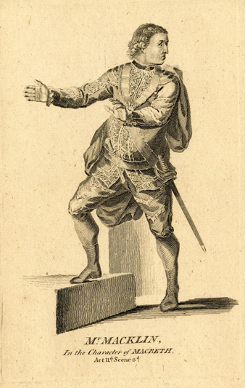Quote
"Suppose an Author should bring a Tragedy to Mr. Garrick, in which the capital Character, through madness or fatigue of passion, even to the exhaufting of all strength or "ability to quit the scene, is made to fall asleep upon the Stage -- would Mr. Garrick approve of it?"
Links to the Encyclopedia:
Keywords
We shall lay before the Reader the following criticisms on Mr. Garrick's manner of acting King Lear and Othello, which were written by Mr. Macklin about this time.
"Garrick's Lear and Othello.
"Why did he fall asleep in Lear? Is the "act neceffary in the Play? What is the intent? It is not conducive to forward the Fable. It does not produce any incident, speech, sentiment, passion, or reflection.-- It does not mark or develope any part of the Character. It is one of Shakspeare's weak redundancies, pardonable in him, who wrote in a barbarous age, as to the Drama, but moft unpardonable in an Actor in these times.
"Suppose an Author should bring a Tragedy to Mr. Garrick, in which the capital Character, through madness or fatigue of passion, even to the exhaufting of all strength or "ability to quit the scene, is made to fall asleep upon the Stage -- would Mr. Garrick approve of it? Why, really, to speak my mind honestly of that Gentleman's judgment, I am inclined to believe he would -- for, by the specimens that he has given in his acting; his strange manner of dying and griping the carpet; his writhing, straining, and agonizing; (all of which he has introduced into the profession of acting) there is no new-fangled conceit, of that nature, that I do not think him capable of countenancing; but I am sure, that those who know what nature in the Drama is, would condemn it as a paltry, petit impropriety: but the truth is, he behaved in this trick, (for a mere trick it is in acting) as he did when he played Othello first. When he was studying that Part, he confidered that Quin was a large, corpulent man; and that he himself was a diminutive, mean figure for the Moor; therefore, he knew that Quin could not fall suddenly on the ground, as it were in a fit, without greatly hurting himself, and, perhaps, raising laughter in the Audience; but that he, with his infignificant person, could do it without the risque of either; and, therefore, introduced that shameful scene of the Epilepsy in the 4th Act, which, instead of being applauded, ought to have been exploded with indignation and contempt for his impudence in the first place, in offering such an absurd passage to a thinking and suppofed judicious Public; and, in the next place, for restoring a passage, which, in the records of the Theatre, had never been acted; and which, on and off the Stage, must be looked upon as an excrescence of the worst sort, of the great genius that produced it. The same trick he played in this sleeping excrescence of King Lear -- he knew that Barry, on account of his size, could not be carried off the Stage with the same ease that he could, and therefore introduced it."
Sources
James Thomas Kirkman, Memoirs of the life of Charles Macklin, Esq. principally compiled from his own papers and memorandums; which contain his criticisms on and characters and anecdotes of Betterton, Booth, Wilks, Cibber, Garrick, Barry, Mossop, Sheridan, Foote, Quin, and most of his contemporaries; Together with his Valuable Observations on the Drama, on the Science of Acting, and on various other Subjects: the whole forming a comprehensive but succinct history of the stage; Which includes a Period of One Hundred Years. By James Thomas Kirkman, of the Honourable Society of Lincoln's Inn. In two volumes. ... London: Publisher: printed for Lackington, Allen, and Co. Temple of the Musks, Finsbury Square, 1779, volume 2, p. 259-261. Transcription by Alain Kerhervé. Full text in ECCO.
